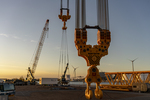News Release from TenneT TSO GmbH
Wind Industry Profile of
TenneT places artificial reefs near offshore platform Hollandse Kust (west Alpha)
This offshore transformer platform will connect the Ecowende (Shell/Eneco) consortium wind farm to the high voltage grid. The aim is to build this wind farm with a healthy ecosystem and as little impact on nature as possible. The artificial reefs are part of a series of ecological measures by TenneT to monitor and encourage nature around offshore wind farms.
By 2050, energy production must be completely climate-neutral. One of the main pillars to achieve this goal is offshore wind energy and the North Sea is becoming our main power plant. However, all this infrastructure may have an impact on the ecology of the North Sea. Saskia Jaarsma, head of offshore development at TenneT: "We are aware of the potential impact on the North Sea. That's why we pay a lot of attention in researching what happens underwater. The installation of artificial reefs is another step in researching, monitoring and stimulating marine life."
Shelter and food - Nature-friendly recycled material
To find out which form works best, two types of artificial reefs have been placed near the Hollandse Kust west alpha jacket, located about 50 kilometers off the coast of Egmond aan Zee. Earlier, similar structures were placed at the TenneT platform at Hollandse Kust north. Six reef cubes are attached to one frame. Hollow square blocks made of nature-friendly recycled material with round holes in the walls. On the other steel frame are six reef balls, a similar structure but in the shape of a ball. "These artificial reef structures are meant to stimulate marine life. With these, you create potential spots where coral and algae settle. Earlier research shows that fish, crabs and lobsters like to visit these spots for shelter and to look for food," says Annemiek Hermans. As a marine biologist, she advises TenneT on nature-inclusive construction at sea.
Great value for ecology - Protection for young fish
The aim of the trial is to investigate which shape - ball or cube - works best in the waters off our coast. The hollows provide protection for young fish, but are also meant to increase the structure's bonding surface. "In this way, we hope to provide a suitable place for numerous other animal and plant species in addition to juvenile fish, crabs and lobsters," Hermans said. As a marine researcher, Hermans welcomes the similar initiatives being taken from the wind industry. Jaarsma:
"Only in this way can you gain the necessary knowledge and experience to build nature-inclusively. Otherwise you never find out what the success rate of a measure is. These pilots are relatively intensive to realise, but of great value for ecology. For example, the first effects of the ecological cable crossings at wind farm Hollandse Kust zuid are already surprisingly good, we see a lot of life developing there."
Responsibility - For everything that lives in our North Sea
Hermans: "With the firm ambition for offshore wind, it is more than understandable that there are concerns about the ecological effects. After all, that roll-out comes with great responsibility for everything that lives in our North Sea. Gathering knowledge quickly as we are used to these days is unfortunately not going to work because nature will not be rushed in its development.”
Checking in - Diversity of life forms
Hermans expects that it takes up to three years to see clearly visible differences. "Until then, we monitor annually whether the diversity of life forms around the artificial reefs and fish hotels increases. Fish lose scales and cells, for example, and feces also end up in the water. By reading DNA in water samples, you can find out pretty quickly which guests have checked in."
Investigate, monitor and keep experimenting - Exchange of knowledge
Jaarsma: "A number of measures to stimulate marine life, such as the fish hotels on our jackets, are now standard at TenneT’s offshore assets, while we always keep an eye out for innovation. We assess new nature-enhancing proposals on technical feasibility, impact on planning, nature and on costs and risks. We monitor all measures for ecological success, in order to learn more about what works well and what does not. We continue to experiment in this and exchange our knowledge with all stakeholders in the North Sea, so that the whole sector can contribute to stimulating ecology around offshore wind farms."
- Source:
- TenneT
- Author:
- Press Office
- Link:
- www.tennet.eu/...
- Keywords:
- TenneT, artificial, reef, offshore, wind farm, Netherlands, transformer platform, Hollandse Kust, west alpha, construction, potential, ocean, marine, wildlife


























